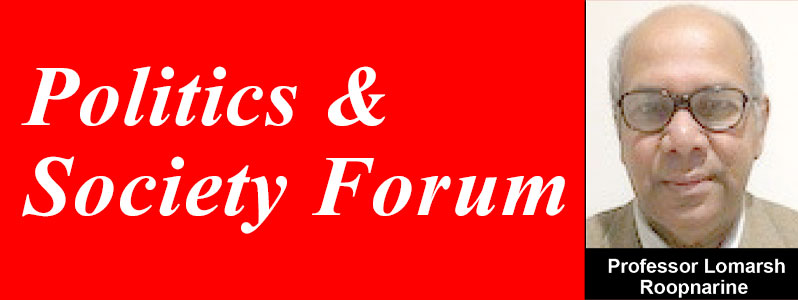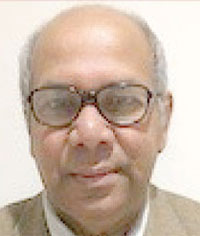LAST Tuesday, I watched and listened with much delight to the discussion/exchange between Vice President Bharrat Jagdeo (BJ) and Glenn Lall (GL) on the latter’s radio show also aired on Facebook. I joined and stayed on the virtual programme for over two hours, and thought the above deserves some analyses. I waited, however, to do this write-up until Friday evening to see what would be published in Kaieteur News (KN) regarding the BJ and GL exchange.
I am also encouraged to analyse the above to follow up on what I wrote on July 3, 2022 in this space.
“There is, however, something cathartic about the team at KN speaking on Guyana’s natural resources that is refreshing. I appreciate the candor, which can be more appreciated if the reporting is based on facts and balance, otherwise readers and listeners will not believe the malarkey, and that YouTube programme will turn into a snooze fest. I am sure the team is aware of the following idiom: “He who is of much bombast and boorishness will certainly experience a falling out with his erstwhile supporters.”
I will examine three hot spots in the exchange as objectively as possible, notably on what KN chose not to publish. To remind readers, the following is what was published in KN on the BJ/GL exchange, on the Glenn Lall Show — “Jagdeo was asked a series of questions about the deal that was signed with ExxonMobil Corporation affiliate, Esso Exploration and Production Guyana Limited (EEPGL) and its partners, Hess Corporation and CNOOC Petroleum Limited. Lall’s first question sought to ascertain if Jagdeo maintained his criticisms of the contract, which were first divulged during his time in opposition.” Fair enough, and the message was that BJ first criticised the oil contract when in opposition and now in government he is not willing to renegotiate it. Okay, let us move on.
First off, let me say that I do not agree with most of the contents in the 2016 oil contract, and so I am not supporting a lopsided contract that disfavours Guyana and benefits oil companies. My intention here is to unravel misinformation in an already confusing and misleading situation in Guyana on this oil and gas thing. I was shocked that BJ told GL that his newspaper publishes lies regularly and he was sued many times for doing so. GL just shrugged it off.
Lall posed the question to Jagdeo on the monitoring of the oil companies in Guyana, and the former insisted that Guyana should monitor the companies in “real time-” meaning that as events within the oil companies unfold or occur. I was shocked that GL appeared not to understand how oil companies are monitored or audited. Monitoring of oil companies in Guyana could only be monitored and audited after certain financial events occurred (post-expenditure), say, for example, if an oil company subcontracts to another company that led to a wanton wastage of finances. Guyana can only monitor or prevent this from happening if Guyana is a co-partner. Guyana is not a co-partner in the ownership of how oil is extracted. Guyana has allowed oil companies to invest in the country with the expectation to receive revenues based on a contract with multiple clauses, which, again, are not favourable to Guyana. Monitoring and auditing of oil companies occur once a year, not in real time, but in the post-expenditure period.
The question about taxes was asked, and we know that oil companies in Guyana do not pay corporate taxes, another sore area in the signed contract. This is an area where GL appeared not to understand. As I understand it, a liability clause in the contract does not give Guyana the “freedom” to change the taxes, say, for example, to introduce windfall taxes or pay taxes like in the United States. In the US, the oil companies pay taxes to the government and they are not bound by liability clauses. The reverse is the case in Guyana because the oil companies are foreign investors. On moral grounds, the oil companies should pay their fair share of taxes to Guyana like they do in the US. This is a pipe dream on my part.
The issue that surfaced was the difference between public and private investment in cases of the Marriott Hotel and the gas-to-shore project, regarding how these investments were/are financed. They have been financed by the government, although it is believed some private investments occurred. It was revealed that GL does not seem to understand the difference between equity and loans; the former is when someone invests in a company and expects a return while the latter is when loans are taken out from the bank to embark on a business. The bank does not have an investment.
My whole purpose of writing this column is that here we had a situation where two individuals with much influence sparred verbally on the Guyana oil and gas industry that resulted in opposing, if not controversial views. To his credit, GL did push BJ to renegotiate the 2016 contract and I do not think a strong local content policy would compensate for losses Guyana has taken in other sectors of the oil and gas industry. I suppose, in the end, Guyanese will benefit from the BJ/GL exchange (lomarsh.roopnarine@jsums.edu)




.png)









